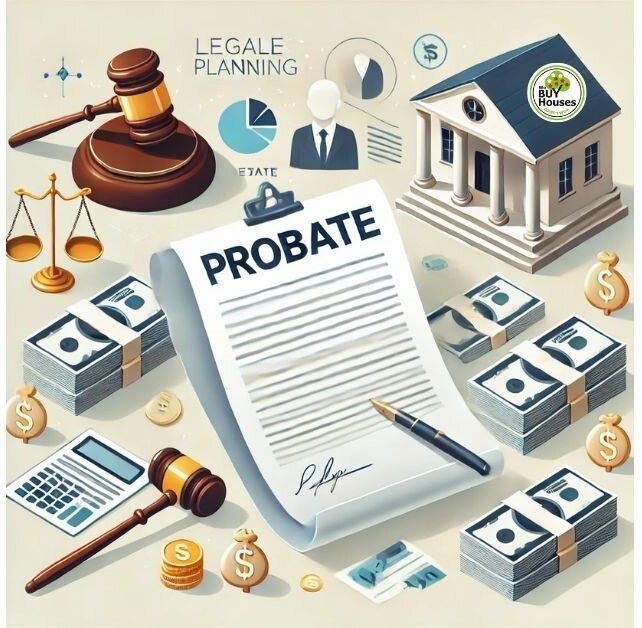
Probate is a legal process that involves managing and distributing a person’s estate after they pass away. It might seem complicated, but with a clear understanding, it can be easier to handle. This guide will break down the probate process step-by-step to make it simple. This guide will help you understand what this process will mean, how to manage it, and why it’s essential.
What is Probate?
Probate is the legal process of administering a deceased person’s estate, ensuring their debts are paid and assets are distributed according to their will, or state laws if there’s no will. It begins when an executor files the will with the probate court, which then validates the document. If there is no will, the court appoints an administrator. The executor or administrator identifies assets, settles debts, pays taxes, and distributes remaining assets to heirs. Probate provides a legal framework to resolve disputes, ensure fair distribution, and protect beneficiaries’ rights. While it is often necessary for large or complex estates, it can be costly and time-consuming. However, understanding probate’s role helps in better estate planning, allowing individuals to take steps to simplify or avoid the process altogether.

When is Probate Necessary?
In many cases, probate is required, especially when titled assets like real estate or significant bank accounts are involved. Even if there is a will, the court needs to confirm its validity before the assets can be distributed.
However, not all estates need to go through probate. Some assets, such as those with named beneficiaries or jointly-owned property, bypass the probate process. Examples include:
- Life insurance policies with a named beneficiary
- Retirement accounts like IRAs
- Jointly-owned real estate
Probate Steps: How Does the Probate Process Work?
Following are the steps of the Probate Process:
- File the Death Certificate
The probate process starts with filing the death certificate at the local court. This is the first step to initiate the process. - Submit the Will
If the deceased left a will, it must be submitted to the probate court. The court will then validate it as the last testament of the deceased. - Appoint the Executor
The court officially appoints an executor, who is usually named in the will. If there is no will, the court assigns an administrator. This person oversees managing the estate during the probate process. - Identify Assets and Debts
The executor must gather details of all assets, including real estate, personal items, and bank accounts. Similarly, any outstanding debts, such as loans or credit cards, must be documented. - Pay Debts and Taxes
Debts and taxes must be settled before distributing any assets. This includes paying off mortgages, credit card debts, and taxes. - Distribute Remaining Assets
After debts and taxes are cleared, the remaining assets are distributed according to the probate will or state laws if there is no will. - Close the Estate
Finally, the executor files a petition to close the estate, marking the end of the probate process.
Types of Probate
Different types of probate processes may apply depending on the estate’s complexity and state laws:

Formal Probate:
Formal probate is a court-supervised process required for complex or contested estates, typically involving larger asset values or disputes among heirs. It is thorough and ensures that all claims, debts, and taxes are properly settled. The court closely monitors the administration, verifying the authenticity of the will, if present, and ensuring fair asset distribution. Executors may need legal guidance, as formal probate involves detailed documentation, court hearings, and potential challenges from creditors or beneficiaries. Though time-consuming, it offers transparency and protection, reducing the risk of legal disputes. It’s mandatory in cases involving significant estates or when there’s no valid will.
Informal Probate:
Informal probate is a simpler, less supervised court process suitable for straightforward estates with clear wills and cooperative heirs. It allows the executor to manage the estate with minimal court involvement, making it quicker and less costly than formal probate. The executor submits the will and other required documents to the court, which then authorizes asset distribution. Beneficiaries and creditors are notified, but the process avoids lengthy court hearings. Informal probate is ideal for smaller estates or when the will is uncontested. While it streamlines administration, it still requires the executor to fulfill legal duties, like paying debts and taxes.
Simplified Probate:
Simplified probate is available in some states for smaller estates under a specific value, making it quicker and less expensive. It involves fewer steps, reducing the time and paperwork needed. To qualify, the estate must meet state-defined limits, often involving minimal real estate and limited financial assets. Beneficiaries or heirs typically file an affidavit or request for simplified probate, which the court reviews before authorizing asset distribution. This process is designed to expedite the settlement, especially when the estate primarily includes personal items, small bank accounts, or modest investments. It’s beneficial for estates with minimal debts and clear heirs.
How to Avoid Probate
Avoiding probate can save time and reduce costs. One effective way is to create a living trust, where assets are transferred to beneficiaries without court involvement. Designating beneficiaries on accounts, such as retirement funds, life insurance, and payable-on-death (POD) accounts, allows assets to pass directly to the named individuals. Jointly-owned property with rights of survivorship automatically transfers to the co-owner, bypassing probate. Additionally, gifting assets during your lifetime can reduce the estate’s size, possibly eliminating the need for probate. Finally, setting up transfer-on-death (TOD) deeds for real estate is another strategy to avoid probate, ensuring a smoother transfer of assets.
- Create a Living Trust: Assets in a living trust bypass the probate process and transfer directly to the beneficiaries.
- Name Beneficiaries on Accounts: Designate beneficiaries for accounts like retirement plans, life insurance, and payable-on-death (POD) bank accounts.
- Joint Ownership: Joint ownership with rights of survivorship ensures that the co-owner inherits the asset without going through probate.
- Make Gifts During Your Lifetime: Gifting assets while alive reduces the estate size, potentially eliminating the need for probate.
Read More:

Read More:
Mortage Forbearance Agreement: Explained
What Assets Go Through Probate?
Understanding what assets are subject to probate is crucial for planning. The following assets typically require probate:
- Individually Owned Real Estate: Property solely in the deceased’s name is part of the probate estate.
- Bank Accounts Without Named Beneficiaries: Accounts solely in the deceased’s name require probate to access funds.
- Personal Property: Jewelry, art, furniture, and collectibles fall under probate if not covered by a will.
However, some assets can bypass probate, including:

- Jointly-Owned Property
- Life Insurance with Beneficiary
- Assets Held in a Trust
How Long Does Probate Take?
The probate process generally takes six to nine months, depending on factors like the estate’s size, complexity, and whether the will is contested. In some cases, it may take longer, especially if disputes arise among heirs or creditors.
What is Probate Without a Will?
If a person dies without a will, they are considered to have died “intestate.” In such cases, the probate process follows state laws of intestacy, which determine how assets are distributed. Generally, assets go to the closest relatives, such as spouses or children. However, dying intestate can complicate the probate process, making it longer and potentially more expensive.
Costs Involved in Probate
Probate involves various costs, including court fees, attorney fees, and appraisal fees. Some of the common expenses include:
- Court Filing Fees: Vary by state but are generally a few hundred dollars.
- Attorney Fees: Either charged hourly or as a percentage of the estate.
- Appraisal Fees: For assets that need valuation, such as real estate.
Planning ahead can help minimize these costs. For instance, having a clear and legally valid will reduces disputes and speeds up the probate process.
Simplifying the Probate Process
Creating a well-structured will can significantly simplify probate. It provides clear instructions, reduces potential conflicts among heirs, and ensures a quicker distribution of assets. Additionally, maintaining an updated list of beneficiaries and organizing personal documents can make the probate steps smoother for your loved ones.
The Bottom Line
Understanding the probate process can help ease the stress of settling an estate. Whether you’re managing a loved one’s estate or planning your own, knowing how probate works and the steps to avoid it can save time and money. Proper planning, such as creating a will, setting up trusts, or naming beneficiaries, can streamline the process and minimize potential legal hurdles. With clear guidance, you can ensure a smoother transition for your loved ones and protect your assets.
Kevin Roberts, CEO of We Buy Houses Country Wide, has built a reputation as a skilled real estate expert with over 40 years of experience. With an impressive track record of handling over 500 transactions, including more than 400 personal property deals, Kevin is dedicated to helping homeowners navigate real estate challenges. He has also originated over 5,000 mortgages, making him highly experienced in all facets of real estate.
If you’re facing probate challenges or considering selling a property, let Kevin’s expertise guide you. Reach out today to learn how he can help simplify the probate process and provide solutions tailored to your unique situation.

Kevin J Roberts
Licensed Real Estate Broker & Investor
Kevin Roberts is a seasoned real estate expert with 40+ years of experience, excelling
in property investments, sales, and client satisfaction in the State of California.
FAQs
1. What is the difference between probate and a will?
A will is a document that outlines how assets should be distributed, while probate is the legal process of validating the will and distributing assets.
2. Can probate be avoided?
Yes, probate can be minimized or avoided through living trusts, joint ownership, and naming beneficiaries on accounts.
3. How long does probate take?
The probate process generally takes six to nine months, but it can be longer if disputes arise or the estate is complex.
4. What happens if someone dies without a will?
If there is no will, the estate is distributed according to state intestacy laws, which prioritize close relatives.
5. What is a probate asset?
Probate assets are those that need court approval to transfer, such as individually-owned property or accounts without beneficiaries.

